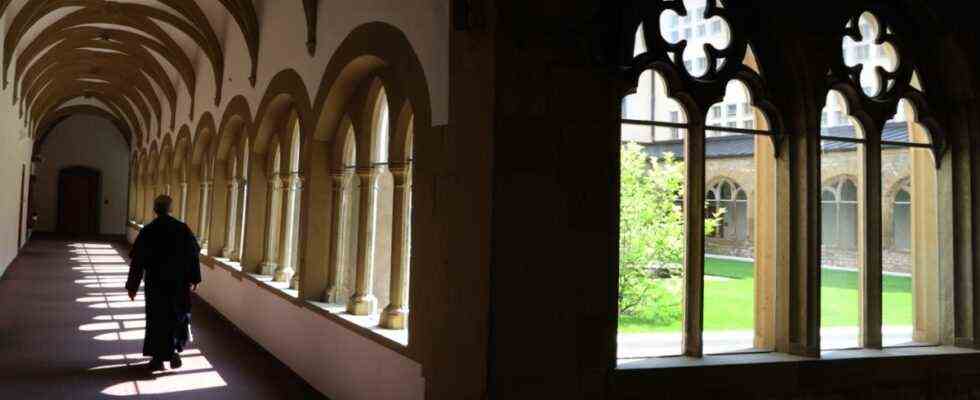It’s about ten minutes on foot from shopping in the Würzburg pedestrian zone to the confessional in the Franciscan monastery. Behind massive doors, a cloister opens up around the inner garden, an oasis of calm that everyone can enter. The followers of Francis of Assisi settled in Germany 800 years ago – the oldest surviving monastery of the so-called begging brothers is in Würzburg.
“Some spontaneously walk into the monastery,” says Brother Adam, the superior of the Würzburg convent. “The problems of the people who come to us make us aware of the problems outside,” says the 55-year-old. “Many suffer from loneliness – and often these are young people. Dependency on the Internet is a big deal.”
Brother Adam wears a black robe with a white belt that has three knots. They represent the vows Adam and his brothers made: poverty, chastity, obedience. The founder of the order, Francis of Assisi, a son of rich cloth merchants, is said to have lived extravagantly as a young man. After a war against the neighboring city of Perugia in the Italian region of Umbria, he ended up in dungeon. Then began a troubling search for the meaning of life. Francis of Assisi gave away everything he owned. The current Pope Francis named himself after him because he put the humble life at the center of his pontificate.
Francis of Assisi wanted to live like Jesus barefoot, in simple clothes and without money. More and more companions joined. In 1219, followers of Francis passed the Alps for the first time. Since they did not speak the language of the country, they were suspected of being supporters of a heretical movement – they were ridiculed, beaten, and driven out. The second attempt followed in 1221, this time successfully. The journey finally led the brothers to Würzburg. In 1249 they were given a larger piece of land and built a monastery church and convent there bit by bit. Actually, the anniversary celebration should increase to 800 years in the current year. Because of Corona, it was postponed to Whit Monday 2022.
15 Minorites, also called “Minor Brothers”, aged 30 to 84 live in the Franciscan Minorite Monastery in Würzburg. They live in voluntary poverty with no personal property. Pants or shoes are usually only changed when they are torn. If a brother needs a ticket or medication, he has to ask the economist for money from the community treasury. There is some kind of pocket money for holidays – that’s not enough for the spa in the luxury hotel next door. The brothers work as pastors, hold religious courses, celebrate church services, and stand up for peace, justice and the integrity of creation.
There are also exotic species: Brother Sandesh Manuel lives in the Franciscan monastery in Vienna. The native Indian is a rapper and Youtuber. In his videos he raps with sunglasses, cap and robe or in shirt and leather trousers texts like: “At Faaker See i lifted my Harley” and “Der Herrgott hot glocht, how he makes Carinthia hot”.
Brother Adam, the superior of the Würzburg convent of the Franciscan Order (right), and Brother Josef, who has been a member of the order for more than 40 years.
(Photo: Karl-Josef Hildenbrand / dpa)
Brother Tobias regularly tours around Würzburg Central Station with his medical kit and takes care of those in need. He is a trained nurse and beer brewer. The beer is tasted in an old construction trailer near the Schönau monastery near Gemünden am Main, where he lives. The brothers say: a place for Bible, beer and encounters. The Würzburg Minorites traditionally distribute snacks for the poor at their gate – with butter, jam, cheese, sausage, sometimes a good word is included. “The Franciscan Minorites are an important point of contact for many believers,” says a spokesman for the Würzburg diocese. The monasteries in Würzburg, Schönau and Mariabuchen in Lohr am Main are “an integral part of the pastoral offer” in the diocese.
Around 40 Minorites live in the six branches in Germany – the average age is over 60 years. According to their own statements, the brothers have had declines of around 50 percent in the “western world”. The Franciscan Sisters are also plagued by concerns about young talent: the three Bavarian provinces of Bamberg, Dillingen an der Donau and Maria Medingen will merge from 2022.
Brother Joseph joined the Order more than 40 years ago. He found a “family community” there, as the 63-year-old says. “At my altar there is a Pole, a Franconian, an Indian, a Palatinate. We tease in between – but the community unites.” According to the junior director, the corona pandemic makes it even more difficult to find interested parties. The program “Franziskaner Minorit on time”, an opportunity to get to know the order and monastery life better, could not take place for a long time. “The image of the church has been damaged by the few young congregations and cases of abuse,” says Brother Josef.
The community therefore takes a critical look at the anniversary year. In the in-house magazine, Brother Stefan Federbusch from the retreat house in Hofheim writes: “Our Franciscan presence in Germany shows, in addition to a credible lifestyle, deficits, failures and guilt of individual brothers as well as the leadership of the order be.” This year, history should therefore be critically reflected on.

